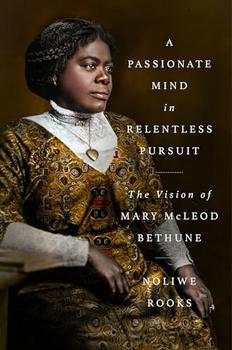Summary | Excerpt | Reviews | Beyond the Book | Readalikes | Genres & Themes | Author Bio

The Vision of Mary McLeod Bethune
by Noliwe Rooks
By the time Mrs. Bethune rose and made clear how she should be addressed, she had spent the past decade providing her expertise to three US presidents. Her path to a seat at the national public policy table began in 1927 when Bethune attended a lunch hosted by Eleanor Roosevelt, the wife of Franklin Delano Roosevelt, who a year later would be elected governor of New York. When the white women in attendance, unused to socializing with Black people, refused to be seated with Bethune, Roosevelt placed Bethune beside her and invited any who objected to the seating arrangements to feel free to leave. The two developed a close friendship and political partnership that lasted through Eleanor's moving into the governor's mansion and later becoming the first lady.
Roosevelt advocated for Bethune to become an adviser to presidents, and the first knock on her door came in 1928, when Calvin Coolidge named her a delegate to a conference addressing child welfare in Washington, DC. Again, she was the only Black person invited to take part. That opportunity led to others. A year later, in 1929, Herbert Hoover asked her to serve on the National Commission for Child Welfare. In that role, she helped to design national surveys on health conditions, infant mortality, and public health programs. The results led to the establishment of the short-lived Child Health Day, programs to professionalize training for midwives, the passage of child labor laws, and vaccination programs to eliminate smallpox and diphtheria. In 1936, President Franklin Delano Roosevelt appointed her to the National Youth Administration (NYA), a federal agency created as part of the Depression-era Works Progress Administration (WPA). NYA programs funneled federal Depression-era relief money, training, programs, and employment opportunities to young people between the ages of sixteen and twenty-five. Bethune lobbied the agency so aggressively and effectively to attend to the needs of Black people who met the qualifications that she earned a full-time staff position in 1938. When she rose to speak at the Birmingham conference, it was as the director of the Division of Negro Affairs. In that role, she was the first Black person ever to heathe onlyd a federal division and at the time was the highest-paid Black person to have worked for the US government. There is also a real argument to be made that through her various roles in the Roosevelt administration, she had an impact in shifting the Black vote from one that had been reliably assumed by Republicans, given that Abraham Lincoln had been a Republican, to a bulwark for the Democratic Party, a shift that had culminated a few years before with the 1936 presidential election.
Finally, she was also able to use her access to the highest reaches of government to advocate for and form a coalition of leaders comprised of Black employees of the federal government. They were called the Federal Council of Negro Affairs. It came to be known as the Black Cabinet and served as an informal advisory board to the Roosevelt administration on issues facing Black people in the United States. Whenever the Black Cabinet gathered to meet, they did so either in Bethune's Capitol Hill office or in the living room of her home. She was a woman of drive, impact, and acclaim who at different stages of her life wielded an unusual amount of power. This last might explain why it is so easy to find instances where her friends, biographers, and colleagues describe her as arrogant, plain, dictatorial, unattractive, fat, and difficult. One of the Black cabinet members, Robert Weaver, said she had the "marvelous gift of effecting feminine helplessness in order to attain her aims with masculine ruthlessness."
When I first read Weaver's opinion of Bethune and tried to turn and twist it as one does when puzzling over the missing pieces needed to create a recognizable border framing a completed life, one of her accomplishments that came to mind involved her role in founding the World War II-era all-Black Air Force unit, the Tuskegee Airmen. She began work toward this goal in 1938 as a way to include Black colleges and universities in FDR's newly instituted Civilian Pilot Training Program, an initiative to ensure the nation had enough pilots in the event of war. The program was funded in part by the NYA and, fortuitously, Bethune headed its "Negro Section." She was determined not only to include Black colleges in the initiative but to use the whole as an opportunity to pursue integrating the nation's military. She also planned to have Black women serve as nurses who could provide medical and psychological counseling and support to the Black male pilots. She could clearly see that Black colleges sorely needed the money that came along with the program, Black people needed the military pay and benefits it offered, and Black women needed the opportunity to train for careers in nursing. As soon as the program was announced, she began lobbying President Roosevelt, urging him to extend the opportunity to Black colleges and Black people and to resist the perspective of the southern wing of the Democratic Party, who were ardent segregationists and did not want the military integrated or the federal government to offer Black people any type of training for which the federal government would pay.
Excerpted from A Passionate Mind in Relentless Pursuit by Noliwe Rooks. Copyright © 2024 by Noliwe Rooks. All rights reserved. No part of this excerpt may be reproduced or reprinted without permission in writing from the publisher.
Your guide toexceptional books
BookBrowse seeks out and recommends the best in contemporary fiction and nonfiction—books that not only engage and entertain but also deepen our understanding of ourselves and the world around us.